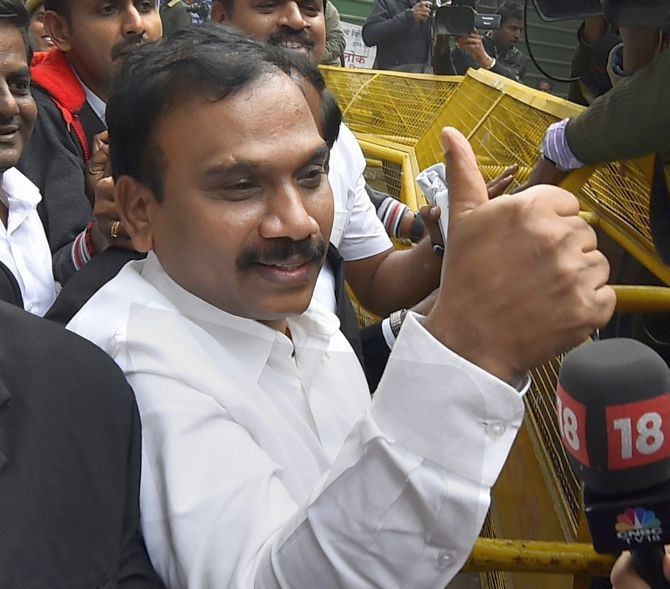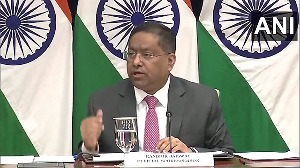'At least three top bureaucrats have been declared guilty in recent years in connection with scams where they had no pecuniary benefit.'
'But in the telecom case, a money trail is declared irrelevant because no scam has been proved in the first place.'
'Fair enough; so we must punish illegality without criminality, but ignore possible criminality as suggestive of illegality,' points out T N Ninan.

IMAGE: Former telecom minister A Raja gives the thumbs up after he was acquitted by a special court in the 2G scam case. Photograph: Kamal Singh/PTI Photo
'Why, sometimes I've believed as many as six impossible things before breakfast.'
-- Lewis Carroll, Alice in Wonderland.
So here are six things coming to us as judicial findings, or flowing from them: There was no telecom scam.
Andimuthu Raja did nothing wrong.
The government lost no money.
The whole thing was just wrong public perception.
The Supreme Court was off its rocker.
And a rogue Comptroller and Auditor General dreamt up fanciful numbers.
If we believe those six, here's what else we have to reckon with:
The first-come, first-served policy for giving out scarce radio spectrum had logic to it, and the government has the right to make policy.
Forget that, more than three years earlier, the prime minister had argued for the auction of coal mines when there were many more applicants than coal blocks. No first-come, first-served then.
Apart from which, within a matter of hours on a fateful day in January 2008, the first-come, first-served policy had been twisted out of shape -- not once, but twice.
First, by retrospectively changing the qualifying date, and then by changing the ranking method for those who got a letter of intent.
There was nothing wrong with the note that Mr Raja sent to the prime minister, spelling out his proposed course of action.
A problem was caused only because two officials in the prime minister's office did not brief the prime minister on the full import of the note.
But if there was nothing wrong with the action proposed in the note, how can a problem be caused by its approval, based on either a selective or full briefing?
At least three top-rung bureaucrats have been declared guilty in recent years, in connection with scams where they had no pecuniary benefit. But in the telecom case, a money trail is declared irrelevant because no scam has been proved in the first place.
Fair enough; so we must punish illegality without criminality, but ignore possible criminality as suggestive of illegality.
We are told that giving cheap spectrum to more operators in 2008 lowered telecom costs and expanded the market. But tariffs continued to fall after spectrum was auctioned at sky-high prices in 2010, and the market continued to expand too.
Bear in mind also that when eight companies had their Raja-given licences cancelled by the Supreme Court in 2012, they were not prime movers driving pricing and market expansion; rather, they were bit players with a combined market share of less than 8 per cent.
Even if you ignore the issue of the counter-factual, Mr Raja's spectrum pricing and the growth of the telecom market were not cause and effect.
Practically everyone in the government was trying to limit the damage.
The law minister suggested that a group of ministers consider the issue, so the judge raps him on the wrist.
Officials suggested hybrid pricing, to minimise the loss from under-priced sale; they get hauled up for partial briefing.
A telecom secretary who blocks Mr Raja is criticised, another who plays along is innocent.
As for those calculations of astronomical losses, were they pulled out of Vinod Rai's hat?
One figure of potential loss was based on what an operator, S Tel, had offered to pay for spectrum.
Another figure was derived from the prices that overseas telecom operators paid for buying into companies that had no assets other than spectrum. And so on.
The Central Bureau of Investigation came up with its independent assessment of loss; but we can't believe the CBI, can we?
Finally, three companies whose telecom licences were scrapped by the Supreme Court were fined Rs 5 crore each, and five others Rs 5 lakh each, as they were the beneficiaries of the 'wholly arbitrary and unconstitutional action' by the department of telecommunications.
Since there was no scam and no illegality, the companies should ask the court for a refund, with interest and penalty for collateral damage.
In the end, one can only take recourse again to Lewis Carroll: 'Well, I never heard it before, but it sounds uncommon nonsense.'












 © 2025
© 2025